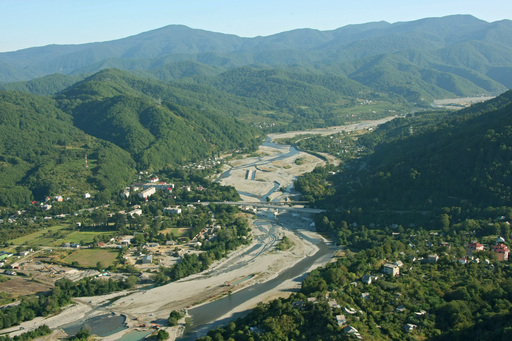
Expert Cites Dangers of Syrian Circassians’ Return to the North Caucasus
Publication: Eurasia Daily Monitor Volume: 9 Issue: 80
By:

The Russian federal agency for CIS affairs, compatriots and international humanitarian cooperation unveiled plans for holding a conference of compatriots in Beirut, Lebanon before the end of this May. The agency’s head, Konstantin Kosachyov, told members of the Russian Federation Council that the agency was prepared to work not only with compatriots, but also with the ethnic diasporas abroad. Kosachyov stated that the Russian Foreign Ministry had approved of the agency’s plans to raise the Syrian Circassians’ plight at the conference. Kosachyov did not rule out the possibility of holding a separate conference on the Syrian Circassian issue. Albert Kazharov, a Kabardino-Balkarian deputy in the Federation Council, hailed the Russian government agency’s willingness to intervene in the process of alleviating the Syrian Circassians’ hardships, but warned against “dramatizing” the humanitarian situation in Syria. Earlier, in March, Kazharov visited Syria along with other Russian officials and Circassian activists on a fact-finding mission (https://www.council.gov.ru/inf_ps/chronicle/2012/04/item19336.html, April 20).
An official Russian parliamentary mission to Syria in March, of which Kazharov was a member, reached several harsh conclusions about the situation in its report. The mission determined that at least 10 Circassians had been killed in the conflict in Syria and a significant number of them were wounded. Members of the Syrian Circassian community were also kidnapped, threatened and tortured. The mission said the situation in the city of Homs, where Circassians used to reside in substantial numbers, was characterized by famine and an absence of medical assistance. Syrian Circassians fled from some regions to the capital, Damascus. Moreover, the Circassian community reportedly feared the Syrian opposition coming to power and unleashing repression against them as a pro-Assad group (https://www.elot.ru/main/index.php?option=com_content&task=view&id=2828&Itemid=1, April 16). Thus the report certainly portrayed the Syrian Circassians’ situation in remarkably bleak tones that hardly need further dramatizing.
According to Naima Neflyasheva, a senior researcher at the Center for Civilizational and Regional Studies at the Russian Academy of Sciences and an ethnic Circassian, there are between 80,000 and 100,000 Circassians in Syria. Most of them live in Damascus, Aleppo and Homs. Circassians lived in 11 villages around Homs, but all of them have become refugees. Neflyasheva said that while Homs has practically been destroyed, two of its districts, al-Baiada and Khalidiya, are currently the most dangerous places for the Circassians. She asserted that a decision on the Circassians has not been taken in Moscow because there is no unity on the issue within the Russian political leadership. Neflyasheva concluded that she did not expect the Russian government to undertake a massive repatriation effort, despite the fact that a policy of “silence in response” has become ineffective, especially against the backdrop of the rise of the Circassian issue in the run up to the Sochi Olympics in 2014 (https://kavpolit.com/ne-protyanut-ruku-pomoshhi-sirijskim-cherkesam-po-menshej-mere-beschelovechno/, April 12).
Andrei Areshev, a researcher at the Center for Central Asia, Caucasus and Urals-Volga region at the Russian Institute for Eastern Studies, said that the Russian government’s reluctance to act on the pleas of the Circassians has had a negative impact on Russia’s image, especially since Turkey has provided assistance to the Circassians. At the same time, Areshev warned: “Any reaction [by the Russian government] to [the plight of] the Syrian Circassians may become yet another, although circumstantial, factor in exporting Middle Eastern instability to the North Caucasus. In addition, the move will provide the final legitimization of the ‘Circassian question’ as an international, not a just an internal Russian issue.” The West, according to Areshev, will use the Circassian card against Russia. Probably due to these fears, the Russian government so far has allowed only several dozen Syrian Circassians to temporarily relocate to the North Caucasus (https://geopolitica.ru/Articles/1412/, April 17).
Areshev’s words are emblematic of the Russian government’s fears and feeling of vulnerability. It appears that the idea that Russia is surrounded by enemies who try to use every opportunity to harm Russia, albeit for no clear and easily comprehensible reason, has become ingrained not only in government circles, but also among the country’s academics. This view also explicitly or implicitly dismisses all existing problems in Russia, especially those in the North Caucasus, portraying them as mere manifestations of hostile influence from abroad. This worldview has become a self-fulfilling prophecy, given that Russians invariably tend to regard any form of foreign assistance for the country’s aggrieved and disenfranchised groups as a hostile act. However, the withdrawal of support for those in need of support in Russia does little good to anyone. For example, since foreign humanitarian and other organizations largely pulled out from the North Caucasus in the early 2000s, the violence in the region has spiraled to levels now comparable to the civil war in Afghanistan.
The government’s counterinsurgency policies in Kabardino-Balkaria are increasingly provoking a popular backlash as the level of public trust in the authorities plummets. On April 21, about 100 protesters blocked a federal highway in the town of Baksan. The protesters demanded the release of the body of a slain suspected rebel, asserting that he was not involved in illegal activities. On April 20, the police attempted to arrest Takhir Khandokhov, a 29-year-old wrestling coach, but were reportedly forced to kill him because he put up armed resistance. Postmortem, Khandokhov was declared an “insurgent accomplice” (https://kabardino-balkaria.kavkaz-uzel.ru/articles/205349/, April 21). The label “insurgent accomplice” normally means that the police do not have much information on the person’s actual involvement in the insurgency, much less proof of his guilt, because when they do, the slain person is simply declared to have been an insurgent.
As Moscow grapples with the Circassian issue, the security situation in Kabardino-Balkaria appears to be rapidly deteriorating. The government’s excessive reliance on the security services, with no tangible civilian oversight of their activities, is increasing distrust of Moscow and its affiliates on the ground. By blaming its own shortcomings on shadowy foreign forces, Moscow may further scare off foreign actors from getting involved in humanitarian and development programs in the North Caucasus, but it will hardly solve the pressing issues that both Moscow and the region are facing.




